- Home
- Thomas Hardy
Jude the Obscure Page 10
Jude the Obscure Read online
Page 10
IX
It was some two months later in the year, and the pair had metconstantly during the interval. Arabella seemed dissatisfied; shewas always imagining, and waiting, and wondering.
One day she met the itinerant Vilbert. She, like all the cottagersthereabout, knew the quack well, and she began telling him of herexperiences. Arabella had been gloomy, but before he left her shehad grown brighter. That evening she kept an appointment with Jude,who seemed sad.
"I am going away," he said to her. "I think I ought to go. I thinkit will be better both for you and for me. I wish some things hadnever begun! I was much to blame, I know. But it is never too lateto mend."
Arabella began to cry. "How do you know it is not too late?" shesaid. "That's all very well to say! I haven't told you yet!" andshe looked into his face with streaming eyes.
"What?" he asked, turning pale. "Not...?"
"Yes! And what shall I do if you desert me?"
"Oh, Arabella--how can you say that, my dear! You KNOW I wouldn'tdesert you!"
"Well then--"
"I have next to no wages as yet, you know; or perhaps I should havethought of this before... But, of course if that's the case, we mustmarry! What other thing do you think I could dream of doing?"
"I thought--I thought, deary, perhaps you would go away all the morefor that, and leave me to face it alone!"
"You knew better! Of course I never dreamt six months ago, or eventhree, of marrying. It is a complete smashing up of my plans--I meanmy plans before I knew you, my dear. But what are they, after all!Dreams about books, and degrees, and impossible fellowships, and allthat. Certainly we'll marry: we must!"
That night he went out alone, and walked in the dark self-communing.He knew well, too well, in the secret centre of his brain, thatArabella was not worth a great deal as a specimen of womankind.Yet, such being the custom of the rural districts among honourableyoung men who had drifted so far into intimacy with a woman as heunfortunately had done, he was ready to abide by what he had said,and take the consequences. For his own soothing he kept up afactitious belief in her. His idea of her was the thing of mostconsequence, not Arabella herself, he sometimes said laconically.
The banns were put in and published the very next Sunday. The peopleof the parish all said what a simple fool young Fawley was. All hisreading had only come to this, that he would have to sell his booksto buy saucepans. Those who guessed the probable state of affairs,Arabella's parents being among them, declared that it was the sort ofconduct they would have expected of such an honest young man as Judein reparation of the wrong he had done his innocent sweetheart. Theparson who married them seemed to think it satisfactory too. And so,standing before the aforesaid officiator, the two swore that at everyother time of their lives till death took them, they would assuredlybelieve, feel, and desire precisely as they had believed, felt, anddesired during the few preceding weeks. What was as remarkableas the undertaking itself was the fact that nobody seemed at allsurprised at what they swore.
Fawley's aunt being a baker she made him a bride-cake, sayingbitterly that it was the last thing she could do for him, poor sillyfellow; and that it would have been far better if, instead of hisliving to trouble her, he had gone underground years before with hisfather and mother. Of this cake Arabella took some slices, wrappedthem up in white note-paper, and sent them to her companions in thepork-dressing business, Anny and Sarah, labelling each packet "_Inremembrance of good advice_."
The prospects of the newly married couple were certainly not verybrilliant even to the most sanguine mind. He, a stone-mason'sapprentice, nineteen years of age, was working for half wages tillhe should be out of his time. His wife was absolutely useless in atown-lodging, where he at first had considered it would be necessaryfor them to live. But the urgent need of adding to income in ever solittle a degree caused him to take a lonely roadside cottage betweenthe Brown House and Marygreen, that he might have the profits of avegetable garden, and utilize her past experiences by letting herkeep a pig. But it was not the sort of life he had bargained for,and it was a long way to walk to and from Alfredston every day.Arabella, however, felt that all these make-shifts were temporary;she had gained a husband; that was the thing--a husband with a lotof earning power in him for buying her frocks and hats when he shouldbegin to get frightened a bit, and stick to his trade, and throwaside those stupid books for practical undertakings.
So to the cottage he took her on the evening of the marriage, givingup his old room at his aunt's--where so much of the hard labour atGreek and Latin had been carried on.
A little chill overspread him at her first unrobing. A long tail ofhair, which Arabella wore twisted up in an enormous knob at the backof her head, was deliberately unfastened, stroked out, and hung uponthe looking-glass which he had bought her.
"What--it wasn't your own?" he said, with a sudden distaste for her.
"Oh no--it never is nowadays with the better class."
"Nonsense! Perhaps not in towns. But in the country it is supposedto be different. Besides, you've enough of your own, surely?"
"Yes, enough as country notions go. But in town the men expect more,and when I was barmaid at Aldbrickham--"
"Barmaid at Aldbrickham?"
"Well, not exactly barmaid--I used to draw the drink at apublic-house there--just for a little time; that was all. Somepeople put me up to getting this, and I bought it just for a fancy.The more you have the better in Aldbrickham, which is a finer townthan all your Christminsters. Every lady of position wears falsehair--the barber's assistant told me so."
Jude thought with a feeling of sickness that though this might betrue to some extent, for all that he knew, many unsophisticated girlswould and did go to towns and remain there for years without losingtheir simplicity of life and embellishments. Others, alas, had aninstinct towards artificiality in their very blood, and became adeptsin counterfeiting at the first glimpse of it. However, perhaps therewas no great sin in a woman adding to her hair, and he resolved tothink no more of it.
A new-made wife can usually manage to excite interest for a fewweeks, even though the prospects of the household ways and meansare cloudy. There is a certain piquancy about her situation, andher manner to her acquaintance at the sense of it, which carries offthe gloom of facts, and renders even the humblest bride independentawhile of the real. Mrs. Jude Fawley was walking in the streets ofAlfredston one market-day with this quality in her carriage when shemet Anny her former friend, whom she had not seen since the wedding.
As usual they laughed before talking; the world seemed funny to themwithout saying it.
"So it turned out a good plan, you see!" remarked the girl to thewife. "I knew it would with such as him. He's a dear good fellow,and you ought to be proud of un."
"I am," said Mrs. Fawley quietly.
"And when do you expect?"
"Ssh! Not at all."
"What!"
"I was mistaken."
"Oh, Arabella, Arabella; you be a deep one! Mistaken! well, that'sclever--it's a real stroke of genius! It is a thing I never thoughto', wi' all my experience! I never thought beyond bringing about thereal thing--not that one could sham it!"
"Don't you be too quick to cry sham! 'Twasn't sham. I didn't know."
"My word--won't he be in a taking! He'll give it to 'ee o' Saturdaynights! Whatever it was, he'll say it was a trick--a double one, bythe Lord!"
"I'll own to the first, but not to the second... Pooh--he won'tcare! He'll be glad I was wrong in what I said. He'll shake down,bless 'ee--men always do. What can 'em do otherwise? Married ismarried."
Nevertheless it was with a little uneasiness that Arabella approachedthe time when in the natural course of things she would have toreveal that the alarm she had raised had been without foundation.The occasion was one evening at bedtime, and they were in theirchamber in the lonely cottage by the wayside to which Jude walkedhome from his work every day. He had worked hard the whole
twelvehours, and had retired to rest before his wife. When she came intothe room he was between sleeping and waking, and was barely consciousof her undressing before the little looking-glass as he lay.
One action of hers, however, brought him to full cognition. Her facebeing reflected towards him as she sat, he could perceive that shewas amusing herself by artificially producing in each cheek thedimple before alluded to, a curious accomplishment of which she wasmistress, effecting it by a momentary suction. It seemed to him forthe first time that the dimples were far oftener absent from her faceduring his intercourse with her nowadays than they had been in theearlier weeks of their acquaintance.
"Don't do that, Arabella!" he said suddenly. "There is no harm init, but--I don't like to see you."
She turned and laughed. "Lord, I didn't know you were awake!" shesaid. "How countrified you are! That's nothing."
"Where did you learn it?"
"Nowhere that I know of. They used to stay without any trouble whenI was at the public-house; but now they won't. My face was fatterthen."
"I don't care about dimples. I don't think they improve awoman--particularly a married woman, and of full-sized figure likeyou."
"Most men think otherwise."
"I don't care what most men think, if they do. How do you know?"
"I used to be told so when I was serving in the tap-room."
"Ah--that public-house experience accounts for your knowing aboutthe adulteration of the ale when we went and had some that Sundayevening. I thought when I married you that you had always lived inyour father's house."
"You ought to have known better than that, and seen I was a littlemore finished than I could have been by staying where I was born.There was not much to do at home, and I was eating my head off, so Iwent away for three months."
"You'll soon have plenty to do now, dear, won't you?"
"How do you mean?"
"Why, of course--little things to make."
"Oh."
"When will it be? Can't you tell me exactly, instead of in suchgeneral terms as you have used?"
"Tell you?"
"Yes--the date."
"There's nothing to tell. I made a mistake."
"What?"
"It was a mistake."
He sat bolt upright in bed and looked at her. "How can that be?"
"Women fancy wrong things sometimes."
"But--! Why, of course, so unprepared as I was, without a stick offurniture, and hardly a shilling, I shouldn't have hurried on ouraffair, and brought you to a half-furnished hut before I was ready,if it had not been for the news you gave me, which made it necessaryto save you, ready or no... Good God!"
"Don't take on, dear. What's done can't be undone."
"I have no more to say!"
He gave the answer simply, and lay down; and there was silencebetween them.
When Jude awoke the next morning he seemed to see the world with adifferent eye. As to the point in question he was compelled toaccept her word; in the circumstances he could not have actedotherwise while ordinary notions prevailed. But how came they toprevail?
There seemed to him, vaguely and dimly, something wrong in a socialritual which made necessary a cancelling of well-formed schemesinvolving years of thought and labour, of foregoing a man's oneopportunity of showing himself superior to the lower animals, and ofcontributing his units of work to the general progress of hisgeneration, because of a momentary surprise by a new and transitoryinstinct which had nothing in it of the nature of vice, and could beonly at the most called weakness. He was inclined to inquire what hehad done, or she lost, for that matter, that he deserved to be caughtin a gin which would cripple him, if not her also, for the rest of alifetime? There was perhaps something fortunate in the fact that theimmediate reason of his marriage had proved to be non-existent. Butthe marriage remained.

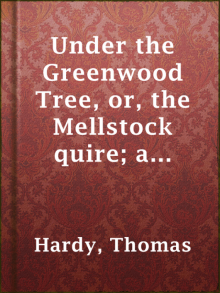 Under the Greenwood Tree; Or, The Mellstock Quire
Under the Greenwood Tree; Or, The Mellstock Quire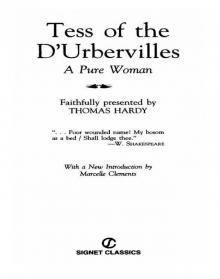 Tess of the D'Urbervilles
Tess of the D'Urbervilles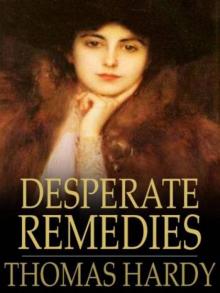 Desperate Remedies
Desperate Remedies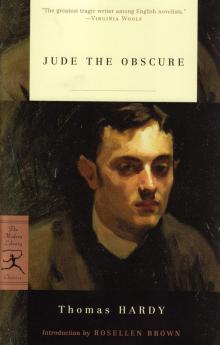 Jude the Obscure
Jude the Obscure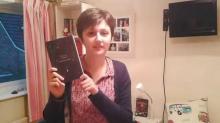 Two on a Tower
Two on a Tower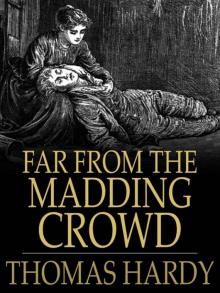 Far from the Madding Crowd
Far from the Madding Crowd The Return of the Native
The Return of the Native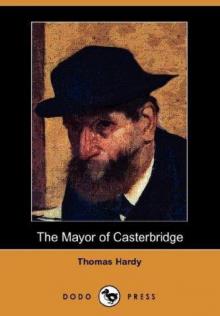 The Mayor of Casterbridge
The Mayor of Casterbridge The Well-Beloved
The Well-Beloved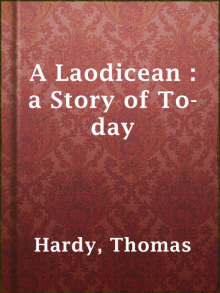 A Laodicean : A Story of To-day
A Laodicean : A Story of To-day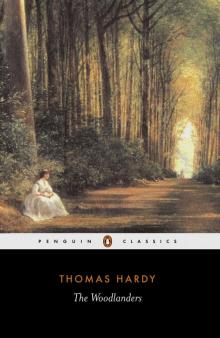 The Woodlanders
The Woodlanders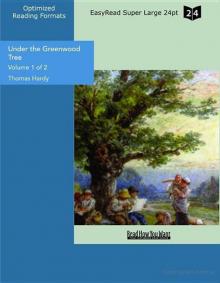 Under the Greenwood Tree
Under the Greenwood Tree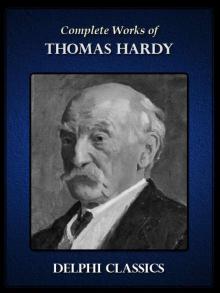 Complete Works of Thomas Hardy (Illustrated)
Complete Works of Thomas Hardy (Illustrated)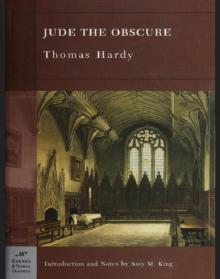 Jude the Obscure (Barnes & Noble Classics Series)
Jude the Obscure (Barnes & Noble Classics Series) The Distracted Preacher
The Distracted Preacher